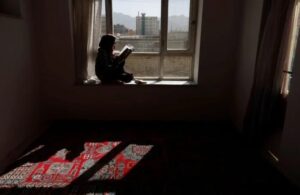KABUL (SW) – Salam Watandar’s findings from interviews with 21 women selling stuff on roads show that in the past two years (after the establishment of the Islamic Emirate in Afghanistan), their numbers have increased due to the increase in poverty.
Among all the women who were interviewed in this report, 10 of them say that they have turned to it more than two years ago, after the increase in poverty among their families.
Shazia, a woman who has been selling water on the roads of Kabul for two years, says that her husband’s income has decreased since two years and it is not enough for her family’s expenses. For this reason, she has turned to roadside work and begging to support her six children alongside her husband.
She adds: “I have a guardian, he goes to the market, he works for 100 afghanis a day, this amount of income is nothing for us, I have had to go out myself. My three children are sick, the government has not helped us at all. If they catch me, they will carry me and take me and take my biometrics as a begger.”
Shahnaz, who sells onions and potatoes by hand in a cart, also says that she has been hawking for two years to support her family of nine.
She adds: “I don’t have a breadwinner at home, I have a child, my child is small, he sells envelopes in Mandwi. My child earns a lot, 50 to 100 afghanis a day. The 150 to 300 afghans that I earn daily is enough for nine families.”
On the other hand, two more of these women say that they had official duties in the past and after restrictions were imposed on women, they were forced to sell on the roads.
Sima, a 40-year-old woman, and Shirin, a 67-year-old woman, who two years ago were workers in two government departments, say that they were cut from the relevant departments and now they have to work hard on the roads to provide food for their families.
Sima says: “I have been selling tissues for a year. I used to cook in the clinic, now because there is no work left, they don’t employ anyone anywhere that’s why I buy paper towels and stand on the road and sell them. I might work for 50 to 80 afghanis a day. I have no one, my husband is dead.”
Shirin also says: “Now this is my cart, these are the ingredients I sell. I used to work at the security in a hospital.”
A number of women who have turned to hard work on the roads of Kabul say that the forces of the Islamic Emirate create obstacles in their work and ask them not to come to the roads.
Shima, one of the women vendors, says: “Tonight we ate bread and tea only, I don’t have enough money for a kilo of meat. One day, Emirate forces told me not to come and sit here. I said, so if I don’t sit here, what should I eat? I said that no one can take me away from here, I am sitting in this corner and I will not harm anyone.”
Soraya, another female peddler, also says: “It’s good that I find the same five loaves of bread. I have never received any help from the government. What to do?”
Among all the women interviewed in this report, 10 of them are widows and 11 of them have guardians, but the bad economic situation has plagued them and they have started hard work on the roads.
However, a number of Kabul residents say that after the establishment of the Islamic Emirate in the country, the presence of women on the roads of Kabul has increased.
Mustafa, a resident of Kabul city, says: “After the arrival of the Islamic Emirate, women peddlers have increased. We have our own stalls. We see two to three to ten women on the side of the Makrorians and on the side of Shahr Nau and Wazir Akbar Khan. The reason is that there are no jobs”
Ahmad Navid, another resident of Kabul city, also says: “During the republic, women were not peddlers, they were only beggars, and now there are more women and the reason is poverty and compulsion. No one works for pleasure, but now the Islamic Emirate has gathered them. The government should cooperate with these women to get out of this situation.”
With this situation, women’s rights activists consider the reduction of work opportunities for women to be the cause of increasing poverty among families and say that some Afghan families have been directly and some indirectly affected by the ban on women’s work.
They add that currently, homeless and destitute women have no other way to earn a living except working on the roads, and for this reason, the presence of women peddlers on the roads has increased.
Hamira Farhangyar, a women’s rights activist, says: “Women are experiencing this situation for the first time in the country, and this is due to their bad economic situation. They don’t earn enough with the items they sell, and even these women don’t have a suitable place to sell, and this causes them to be harassed.”
On the other hand, civil activists consider it against civil principles to make women do hard work on the roads and say that women’s psyche is damaged by such difficult work and this damage affects their families and children as well.
They add that women need work and working conditions should be provided for women according to their personality and psychological characteristics. They want the government to provide certain markets with necessary facilities for women peddlers.
Zakia Muslim, a civil activist, says: “From the point of view of civil rights, when a woman works hard, not only to herself, but it has a negative impact on the entire family.
ENDS






